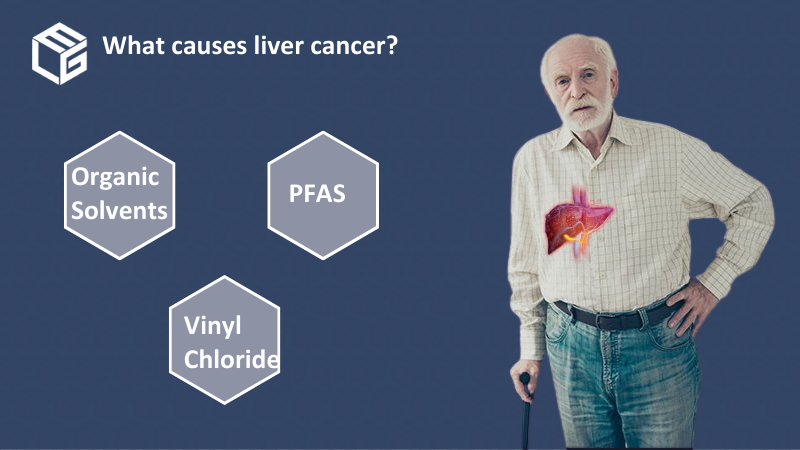Vinyl chloride exposure increases the risk of angiosarcoma, a rare and aggressive form of liver cancer
Due to improper use and disposal of various solvents and other toxic agents, over 700 military bases in the country became heavily polluted during the last century.
Inevitably, everyone who lived at these facilities was exposed to harmful substances, some of which greatly increase the risk of developing liver cancer.
A high liver cancer incidence was observed in men exposed to organic solvents, and the risk was increased in the highest exposure category of the following:
- aromatic hydrocarbons
- aliphatic hydrocarbons
- alicyclic hydrocarbons
- chlorinated hydrocarbons
Some of these solvents lurked in tremendous concentrations on military bases nationwide, endangering the health of service members. Furthermore, a large clinical study from JHEP Reports found that people with high levels of PFOS in their blood are more likely to develop hepatocellular carcinoma, the most common liver cancer type. The mechanisms by which this chemical induces liver cancer include alterations in:
- glucose
- amino acid
- bile acid metabolism
The chemical PFOS was extensively present on military bases after 1967 when firefighters began using the infamous fire suppressant AFFF, which contains between 50% and 98% PFAS. If you are a veteran with liver cancer who spent a significant time at a military base with known toxic contamination and want to file a claim, make sure you meet the eligibility requirements below:
- you must have been discharged from the military other than dishonorably
- you must have been stationed at one or more military bases with documented toxic contamination
- you must have a diagnosis of liver cancer related to toxic exposure
As a family member of a veteran who lived with them at a military base and developed liver cancer, you might also be entitled to compensation. While veterans have to provide our experienced attorneys with their military and medical records, family members need to send in evidence of their stay at the facility along with their medical records.
The risk of developing liver cancer is up to 30% higher among military and civilian firefighters
While firefighters are regularly exposed to countless toxic agents, the main one that contributes to the development and progression of liver cancer is AFFF, the fire suppressant that contains mostly PFAS.
Exposure to these harmful chemicals is associated with increased liver enzymes in cohort studies. In animal models, PFAS disrupt hepatic lipid metabolism and induce apoptosis to cause nonalcoholic fatty liver disease, which can eventually result in liver cancer.
Some of the manufacturers of AFFF are Tyco, Chemguard, and DuPont. If you have liver cancer as a civilian or military firefighter and worked with AFFF for a long time, you might be entitled to compensation. To see whether you are eligible to file a claim for toxic exposure, check out the requirements below:
- you must have been discharged other than dishonorably if you were a military firefighter
- you must have used the fire suppressant AFFF for a significant time
- you must be diagnosed with liver cancer that has a link to toxic exposure
For a thorough case assessment, our diligent attorneys will also ask you to send in your employment or military records, which you must retrieve, and your medical records. These documents will serve as a starting point in evaluating your case, and if we deem you eligible, they will also stand as part of the evidence. Eventually, we will inform you whether you are entitled to financial compensation for your suffering.


